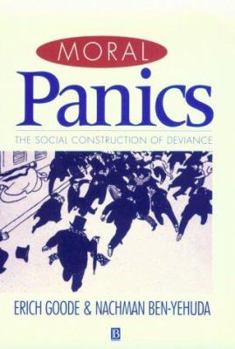Moral Panics: The Social Construction of Deviance
Select Format
Select Condition 
Book Overview
Moral Panics is sure to become a classic in the literature of deviance and criminology. It reviews in a critical and informative manner the core concepts of the discipline taking an international focus. It
Format:Paperback
Language:English
ISBN:063118905X
ISBN13:9780631189053
Release Date:October 1994
Publisher:Wiley-Blackwell
Length:280 Pages
Weight:0.10 lbs.
Dimensions:0.8" x 6.7" x 9.6"
Customer Reviews
1 rating
Did Nancy Reagan cause a moral panic?
Published by Thriftbooks.com User , 21 years ago
"Moral panics" as a defined concept has been around since 1972 when the British sociologist Steven Cohen was attempting to explain the peculiar hysteria surrounding a small, but violent incident between British youths at a seaside resort. The incident took place in 1964 between two youth groups who became known as the Mods and the Rockers. What fascinated Cohen was how an incident seemingly so trivial as that between the Mods and Rockers, could have been taken by the news media, parents groups, and politicians to such hyperbolic heights. Due to Cohen's amazement and his search for a thesis topic, the beginning of a theory explaining the rise and fall of hysteria on a mass scale began. "Moral Panics" is an excellent introductory text to the concept of moral panic theory, besides Cohen's own study - "Folk Devils and Moral Panics: The Creation of the Mods and Rockers" (1972). The correlation of moral panic theory and the wide-scale phenomenon during the 1980s of a growing irrational perception that all drug users were dangerous miscreants, that if drug users are not eradicated the state of America would quickly deteriorate, & c. may not be explicitly evident at first. However, when a false dichotomy between what is really the case and what is thought to be case is exposed and the difference which caused an over-reaction is recognized, then the notion of a moral panic becomes more tenable as an explanation. Not necessarily in the pejorative sense, but naturally, groups of people can be easily led to believe something that is simply not true. Oftentimes, this is because the only perceived source(s) of information are the official mainstream news programs which have from time to time (maybe many, many times) shared in disinformation and/or sensationalism. This book is dedicated to defining moral panics, how they occur, how they are sustained, and, finally, how they decline in the context of what sociologists call Cultural Constructionism. As was mentioned in Erich Goode's book "Strange Bedfellows: Ideology, Politics, and the Drug Legalization Debate in Between Politics and Reason," constructionism is a member of the group of competing notions that either support, study, or oppose drug policy, both nationally and internationally. I would suggest that this entire text be read in order to not only understand drug policy studies in the context of radical (cultural Constructionism) but to understand how moral panics can be created to support any regime's agenda. Chapter 12, for instance, discusses the "crack baby" myth that was taken by the media, politicians, and parents to a height of misinformation and paranoia similar, perhaps, to "reefer madness" back in the 1930s; the crack baby hysteria is discussed in detail, it demonstrates just how easy it is to cause a "panic" about something when relevant information is not either not available or withheld and only rumour, hyperbole, and political rhetoric are the sources of information. It is a good idea to






